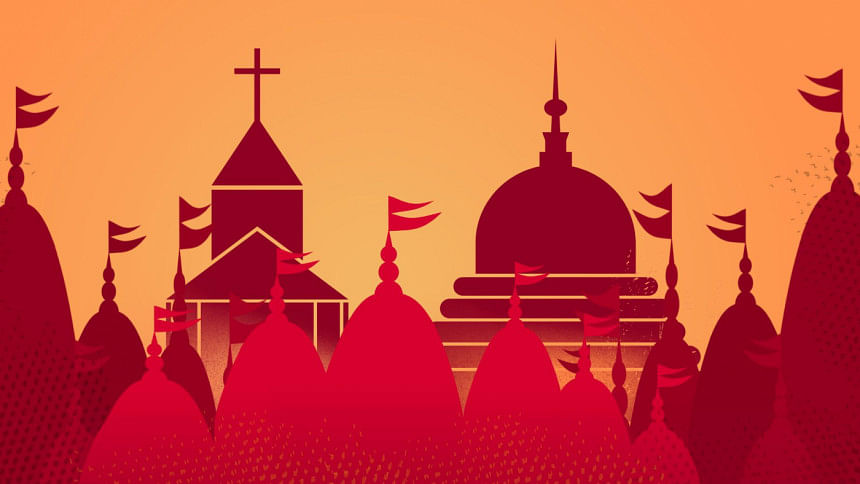Youth mobilise to safeguard minority establishments and places of worship

On August 5, as the county's former Prime Minister resigned, and celebrations ensued across the country, many breathed a sigh of relief. But that wasn't the case for everyone, especially not the religious minorities.
Soon after dark, that same day, temples, churches, and other minority establishments in different districts came under attack. Statues were broken, books were ignited, dumped into water, and guards were brutally beaten up. Bhaswar Roy, 20, one of my closest friends, was the first to tell me how "hellish" his rural hometown had become in just a few hours after Hasina's resignation.
He shares, "Around 4:30 PM on August 5, a Hindu neighbourhood in Khulna, where my relatives reside, was set ablaze. Our temples were attacked and the miscreants responsible for the unrest hurled slangs and curse words at the residents, demanding they leave the country if they want to survive. While people celebrated on social media, us minorities feared for our lives and everything we held dear. Is this freedom?"
This wasn't an isolated incident. Soon after the protest rallies died down, news of targeted assaults and vandalism against religious minorities flooded social media. As a result, the taste of victory was short-lived. For those who put their lives on the line throughout the past few weeks, this was a difficult pill to swallow. This was, in no way, a proper reflection of the victory they fought so hard to achieve.
Accordingly, on the same night, residents from different localities started taking protectionary measures in their own hands. The result: patrol groups were formed to guard minority establishments from goons and hooligans throughout the day.
Nafisa Mehzabin, an undergrad student at North South University (NSU), took an initiative along with two of her friends to assemble a group that would protect the Siddheswari Kali Mandir near Mouchak Market in Dhaka. Sharing the process of gathering volunteers, she says, "It started with one of our friends making a post asking if anyone would be guarding the Kali Mandir on the night of August 5. Soon after, we decided to organise things on our own to form teams."
She continued, "After each of us posted about seeking volunteers, dozens of people reached out to us. By 11 PM, multiple volunteers assured us that they would be able to join the patrol team by midnight."
MD Mujahidul Islam Khan, 27, a student of the Institute of Chartered Accountants of Bangladesh, also took such initiatives around Mohammadpur and Dhanmondi. He says, "People of our age are moved to do the right thing. Once news of communal violence broke out, many wanted to be able to do something about it from their own positions. As such, I made a post on social media seeking volunteers and invited some friends to share it. In a couple of hours, we had a lot of volunteers, the number of which exceeded 1000."
When asked about the areas they patrolled, Mujahid answered, "Firstly, we scouted every temple along the Rayerbazar-Mohammadpur bus stand area, patrolling each location for about an hour. Afterwards, we made our way to the Bashbari Sarbojonin Shri Shri Radha Gobinda Temple."
Samiyee Islam, 24, who is currently pursuing his Bachelor's at Bangladesh University of Engineering and Technology (BUET), volunteered to patrol a temple in his area as well. He shared his experience of safeguarding the area in the dead of night, ensuring no harm would befall his Hindu brothers and sisters.
"Every group of about five to ten people was supposed to guard the temple in three-hour-long shifts. However, I think all of us had stayed much longer on our own accord. The local Hindus were guarding the premises too and they were very hospitable. They treated us to snacks and beverages throughout the night for our kindness. Even the local Muslims – including children, young people, middle aged uncles, and aunties – chose to be there to protect their neighbours and friends," Samiyee shares.
Nafisa also added that many residents of Siddheswari provided the young volunteers with their business cards to call them should any problems arise. She mentions how slowly yet surely, young people's participation has been encouraging the older generations to take a stand themselves, regardless of their religious identities.
However, while all these initiatives are commendable, they're not a solution to the primary problems at hand. Firstly, the very need for protection signals larger issues within our system. Years, if not decades, of religious intolerance, hate, and lack of inclusivity have contributed to ousting religious minorities from public acceptance. This has, in turn, stripped them of their right to feel safe in the country they call home.
Secondly, the presence of a handful of protection groups might perpetuate a false sense of security in the public sphere. One could argue that it has already begun, as evident in the thousands of "#HindusAreSafeInBangladesh" hashtags across social media. While it is true that many people are working hard to ensure that their places of worship remain unharmed, the number is hardly enough to cover every single locality in the country. Therefore, even though violence has hardly waned, forcing many to flee the country, citizens might turn a blind eye due to the apparent image of safety.
Moreover, true justice would be impossible unless change happens from a grassroots level and mindsets take a turn for the better. To combat the never-ending communal violence, diversity, representation, and policies that uphold the rights of religious minorities must be ensured.
Thus, the efforts cannot stop here; until our law enforcement officers return in full-scale, student and community-led protection drives must continue and grow in scale. And most importantly, if we are to establish an inclusive and secular country where people of all identities feel safe, we must come together as a society to uphold the rights and protection of minorities.
Ayaan immerses himself in dinosaur comics and poorly-written manga. Recommend your least favourite reads at [email protected]

 For all latest news, follow The Daily Star's Google News channel.
For all latest news, follow The Daily Star's Google News channel. 








Comments